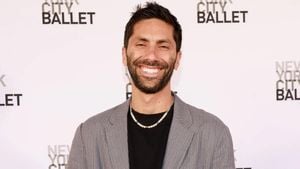Big Brother has found itself at the center of controversy yet again, this time due to issues surrounding censorship and freedom of expression related to the pro-Palestine movement. Recently, the popular reality show's producers made the decision to remove episodes featuring contestants wearing pro-Palestine T-shirts, leading to widespread frustration and disbelief among fans. This incident follows close on the heels of similar controversies and has sparked heated discussions about censorship, compliance, and the representation of political views on television.
This latest uproar began with the well-known reality TV show, Big Brother, whose executives decided to take down the spin-off program Late and Live after its airing on November 4th. The decision reportedly stemmed from compliance issues tied to the clothing worn by contestants during the show. Audience members were unexpectedly hindered from viewing the episode following its initial release due to the symbolic nature of the T-shirts.
Fans noticed the absence of the episode from the ITVX catch-up service, and social media erupted with confusion and frustration. A fan account, SuperTV247, tweeted about the episode’s removal, stating it was taken down due to compliance reasons but reassured viewers it would be available afterward. But the specifics of these compliance issues, including what precisely warranted the removal, were left nebulous, aggravation the audience even more.
This recent censorship has ignited debates around the broader themes of freedom of expression and political representation on mainstream media. A particularly notable case involves Ali Bromley, one of the contestants who wore a T-shirt depicting the map of Israel stylized as a watermelon—a powerful symbol within the pro-Palestine movement. Following this incident, Big Brother received over 500 complaints from viewers concerned about the T-shirt, which they argued sent potentially harmful messages.
According to Ofcom, the media watchdog, this incident resulted in significant viewer backlash. Some fans took to social media to express their outrage, asking, "What now and who decides what’s compliant and what’s not???" Others questioned the show’s integrity, saying, "ITV are the pits behaving like this," highlighting the public sentiment surrounding perceived censorship.
A spokesperson for Big Brother initially addressed the outrage following the editing out of Bromley's watermelon T-shirt, stating, “All Housemate items are checked by our production team before they go to comply with the Rules and compliance requirements.” They added their regret, claiming the potential impact of the item was not considered during the review process.
This isn’t the first controversy within the Big Brother franchise, as Nathan King, another housemate, faced backlash after making dismissive comments about another contestant, Khaled, who has Palestinian roots. Viewers saw this as another episode indicative of broader issues of representation and sensitivity surrounding Palestinian viewpoints. Some fans were appalled at King's remarks, expressing disbelief at how such comments could be accepted within the show’s framework.
While these incidents spurred immediate criticism of Big Brother, they also opened up wider discussions about how media figures navigate sensitive global issues, particularly during the current geopolitical climate. Many viewers stated they felt their protests against censorship and representation could be regarded as counter-productive, as they prompted the continued removal or alteration of politically charged content.
The watermelon symbol itself bears historical significance, coming to prominence during the 1967 Six-Day War, when public displays of the Palestinian flag became illegal. This historical layering gives the watermelon its deep cultural meaning within the pro-Palestine movement, which has gained renewed vigor amid the current conflict, which has tragically resulted in the deaths of more than 42,000 people since the outbreak of violence on October 7, 2023.
Many media experts and social commentators weighed in on the situation. One commentator noted, “The implication of the watermelon T-shirt signifies not just support for Palestine, but also reflects broader sentiments of protest against censorship—with Big Brother at the forefront.” This commentary highlighted how reality television can sometimes inadvertently become ground zero for larger societal debates.
The situation prompted calls for boycotting the show from those who felt their voices were being silenced. A turbulent social media dialogue emerged, where viewers expressed their disdain not only for the censorship of the T-shirt but also for the comments made by certain contestants. It became clear to many fans, both online and off, the emotional stakes for participants and viewers alike have deepened.
Some media analysts commented on the irony of the situation: “A show built on the premise of showcasing varied human experiences seems to be denying its participants their authentic selves.” Such sentiments connected with many fans who recognized the expected allowance of freedom of expression within the program’s philosophy.
Throughout the fray, fans remain curious about how Big Brother will navigate the fallout. They are questioning if there will be changes to how the producers approach issues of compliance, especially concerning potentially controversial political statements made on air. Discussions continue to swirl about whether or not the show is prepared to handle such topics more transparently moving forward.
Alongside these overarching themes, the producers appear to be adamant about maintaining certain standards, adhering to their production codes, yet balancing them with impending viewer expectations. The real challenge lies not just within television programming but rather how society wants to engage with media about contentious political discourse.
Despite the dynamic pressures at play, many fans voiced their hope for change, where reality TV could be emblematic of authentic representation, pointing toward the need for more open dialogues within formats like Big Brother.
The juxtaposition of entertainment and political discourse has never been more pronounced, and it remains to be seen how Big Brother, and reality television as a whole, will adapt to growing pressures from audiences who demand accountability and representation.



